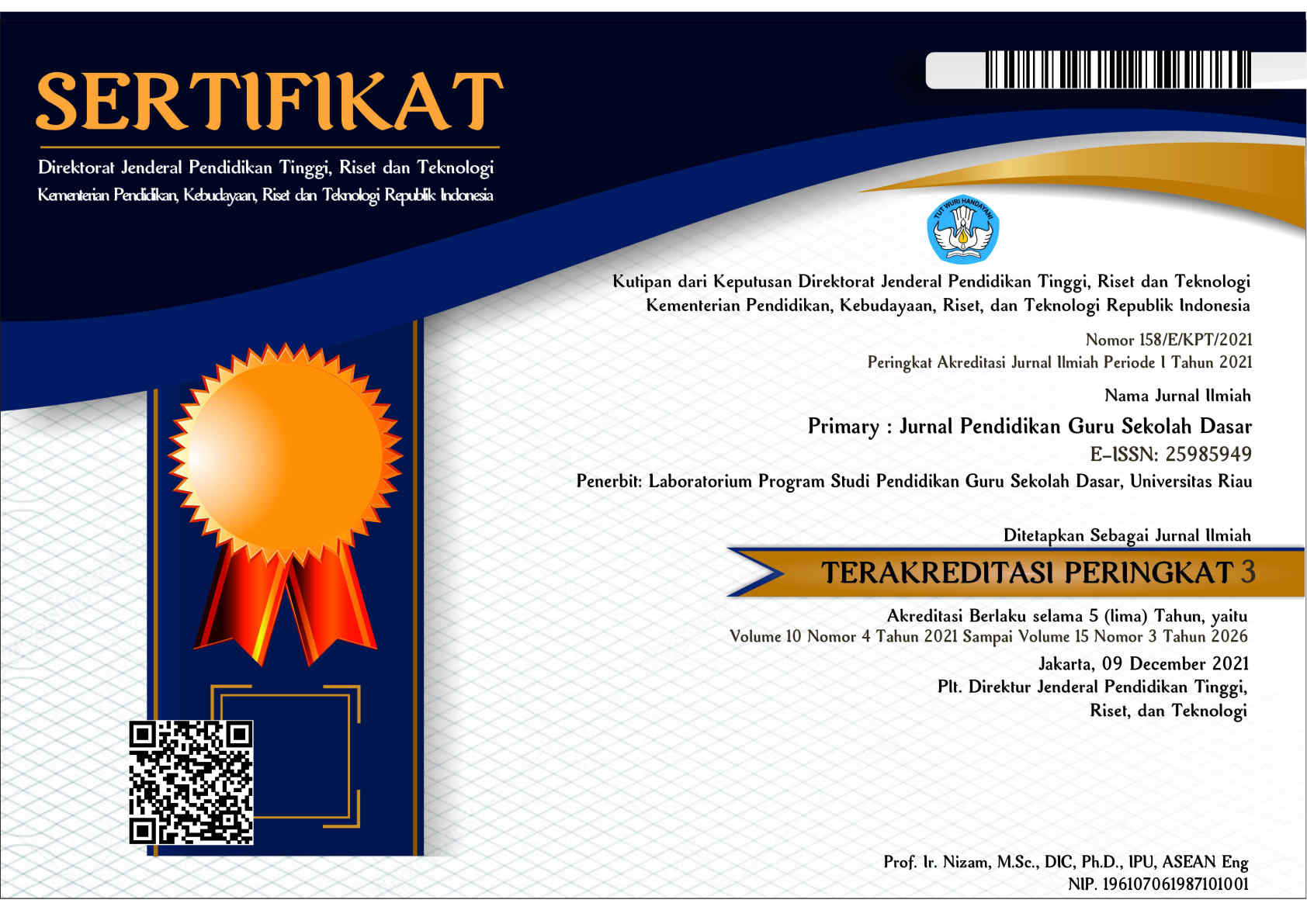PENGARUH EFIKASI DIRI TERHADAP HASIL BELAJAR SISWA SEKOLAH DASAR
Abstract
This study aimed to determine how the influence self-efficacy on students’ learning outcomes. This research included causal ex-post facto research. The research subjects were elementary school students (SD) with a sample of 27 students. Research data collection was carried out by providing instruments in the form of self-efficacy questionnaires and multiple-choice tests that were used to collect information on science learning outcomes, made by adjusting the basic competencies used in the cognitive domain. The results of this study were based on the calculation of the correlation between self-efficacy and learning outcomes showing a correlation coefficient of 0.029 with p <0.05, meaning Ho was rejected and Ha is accepted, if self-efficacy is good, student learning outcomes will be high. There is a positive and significant correlation between self-efficacy and student learning outcomes. From the results of this study, one of the successes of student learning was seen from the level of self-efficacy so that this assessment can be used as a basis for consideration and solutions for teachers in carrying out the teaching and learning process.
Keywords
Full Text:
PDF (Bahasa Indonesia)References
Fitriana. (2015). Pengaruh Efikasi diri, Aktifitas, Kemandirian Belajar, dan Kemampuan Berpikir Logis Terhadap Hasil Belajar Matematika Pada Siswa Kelas VIII SMP Negeri Di Kecamatan Polongbangkeng Utara Kabuapaten Takalar. Universitas Negeri Makassar.
Ghufron, M. N., Suminta, R. R., & Psikologi, P. S. (2013). Efikasi Diri dan Hasil Belajar Matematika : Buletin Psikologi: Fakultas Psikologi Universitas Gadjah Mada, 21(1), 20–30.
Hairida, & Astuti, M. W. (2013). Self Efficacy dan Prestasi Belajar Siswa Dalam Pembelajaran IPA-Kimia. Jurnal Pendidikan Matematika Dan IPA, 3(1), 26–34. https://doi.org/10.26418/jpmipa.v3i1.2207
Hardianto, G., Erlamsyah, E., & Nurfahanah, N. (2016). Hubungan antara Self-Efficacy Akademik dengan Hasil Belajar Siswa. Konselor, 3(1), 22. https://doi.org/10.24036/02014312978-0-00
Hidayat, D. R. (2011). Psikologi kepribadian dalam konseling. Ghalia Indonesia.
Kusuma, Z. L., & Subkhan. (2015). Pengaruh Motivasi Belajar Dan Kedisiplinan Belajar Terhadap Prestasi Belajar Mata Pelajaran Akuntansi Siswa Kelas Xi Ips Sma N 3 Pati Tahun Pelajaran 2013/2014. Economic Education Analysis Journal, 4(1), 164–171.
Lunenburg, F. C. (2011). Self-efficacy in the workplace: implications for motivation and performance. International Journal of Management, Business, and Administration, 14(1).
Mahmudi, M. H., & Suroso, S. (2014). Efikasi Diri, Dukungan Sosial dan Penyesuaian Diri Dalam Belajar. Persona:Jurnal Psikologi Indonesia, 3(02), 183–194. https://doi.org/10.30996/persona.v3i02.382
Monika, M., & Adman, A. (2017). Peran Efikasi Diri Dan Motivasi Belajar Dalam Meningkatkan Hasil Belajar Siswa Sekolah Menengah Kejuruan. Jurnal Pendidikan Manajemen Perkantoran, 2(2), 109. https://doi.org/10.17509/jpm.v2i2.8111
Ningsih, W. F., & Hayati, I. R. (2020). Dampak Efikasi Diri Terhadap Proses & Hasil Belajar Matematika. Journal On Teacher Education (JOTE), 1(2), 26–32.
Ormrod, J. E. (2009). Psikologi pendidikan membantu siswa tumbuh dan berkembang (Ke enam). Erlangga.
Rustika, I. M. (2012). Efikasi Diri: Tinjauan Teori Albert Bandura. Buletin Psikologi, 20(1–2), 18–25. https://doi.org/10.22146/bpsi.11945
Sadi, O., & Uyar, M. (2013). The relationship between self-efficacy, self-regulated learning strategies and achievement: A path model. Journal of Baltic Science Education, 12(1), 21–33.
Santrock, J. W. (2007). Perkembangan Anak (terjemahan),. Erlangga.
Sigiro, O. N., Sigit, D. V., & Komala, R. (2017). Hubungan Efikasi Diri Dan Penalaran Ilmiah Dengan Hasil Belajar Biologi Siswa Sma. Biosfer: Jurnal Pendidikan Biologi, 10(2), 30–34. https://doi.org/10.21009/biosferjpb.10-2.4
Slameto. (2013). Belajar dan faktor-faktor yang mempengaruhinya (Empat). Rineka Cipta.
Sugiyono. (2017). Metode Penelitian Kuantitatif, Kualitatif, dan R&D. Alfabeta.
Tsang, S. K. M., Hui, E. K. P., & Law, B. C. M. (2012). Self-efficacy as a positive youth development construct: A conceptual review. The Scientific World Journal, 2012. https://doi.org/10.1100/2012/452327
Yasa, I. K. D., Pudjawan, K., & Agustiana, I. G. A. T. (2020). Peningkatan Efikasi Diri Siswa Pada Mata Pelajaran IPA Kelas IV SD Melalui Model Pembelajaran Numbered Head Together. Mimbar PGSD Undiksha, 8(3), 330–341.
DOI: http://dx.doi.org/10.33578/jpfkip.v10i5.8467
Refbacks
- There are currently no refbacks.
Copyright (c) 2021 Nasrah Nasrah, Novianti Novianti, Kaharuddin Kaharuddin

This work is licensed under a Creative Commons Attribution-NonCommercial-ShareAlike 4.0 International License.
____________________________________________________________
Primary: Jurnal Pendidikan Guru Sekolah Dasar
Secretariat
Program Studi Pendidikan Guru Sekolah Dasar
Gedung B1, FKIP Universitas Riau
Kampus Bina Widya Km. 12,5 Simpang Baru Panam
Pekanbaru Riau Indonesia 28293
e-mail : primary@ejournal.unri.ac.id



